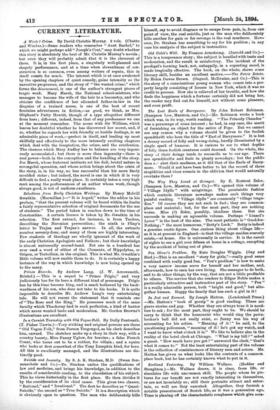C M1RENT LITERATURE.
A Wastel Crime. By David Christie Murray. 2 vole. (Chatto and Winders.)—Some readers who remember "Aunt Rachel," to which we might perhaps add " Joseph's Coat," may doubt whether this story is absolutely the best of Mr. Christie Murray's novels ; but even they will probably admit that it is the cleverest of them. It is, in the first place, a singularly well-planned and shapely performance, and at a time when slovenliness of con- struction is so common, even among writers of repute, this in itself counts for much. The interest which is at once awakened by the opening chapters of quiet comedy, gains intensity as the narrative progresses, and the story of "the wasted crime," which forms the denouement, is one of the author's strongest pieces of tragic work. Mary Marsh, the National school-mistress, who manages to become the wife of the heir to a baronetcy, and who obtains the confidence of her alienated father-in-law in the disguise of a trained nurse, is one of the best of recent feminine adventurers in fiction,—as good, we think, as Mrs. Oliphant's Patty Hewitt, though of a type altogether different from hers ; different, indeed, from that of any predecessor we can at the moment remember. The scene with Sir William, which leaves her doubtful whether he has discovered her secret, and, if so, whether he regards her with friendly or hostile feelings, is an admirable piece of work,—perfect in itself, and leading up most skilfully and effectively to the more intensely exciting chapters which deal with the temptation, the crime, and the retribution. The chances which Mary Andley has to balance are very ingeni- ously accumulated ; but there is more than ingenuity—there is real power—both in the conception and the handling of the story. Joe Marsh, whose fraternal instincts set his dull, brutal nature in revengeful operation, and whose action brings about the crisis of the story, is, in his way, no less successful than his more finely moulded sister ; but indeed, the novel is one in which it is very difficult to find a really weak place. It certainly takes a very high rank among the performances of an author whose work,.though always good, is not of uniform excellence.


































 Previous page
Previous page